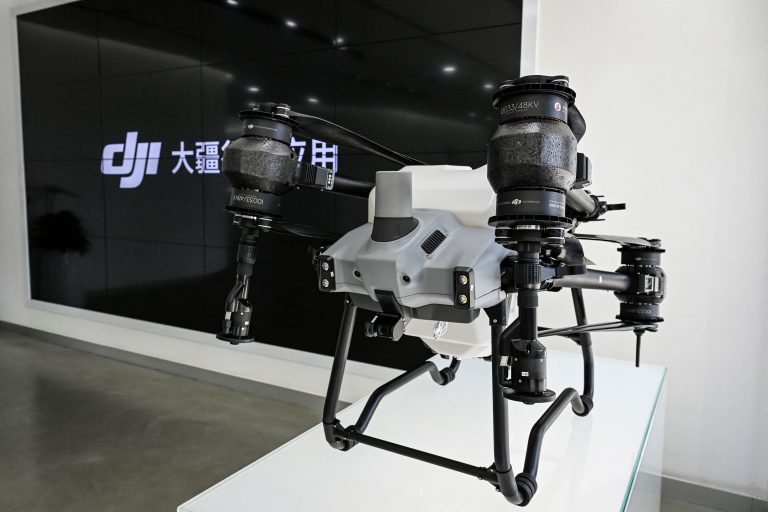On Oct. 5, several Chinese companies, including drone tech giant DJI Technology, were added to the blacklist of companies banned by the United States.
In light of alleged ties between these companies and the Chinese People’s Liberation Army (PLA), the U.S. Defense Department (DoD) hopes to cut off these suspected military ties and prevent advancements by Communist China.
Drones denied
DJI Technology, a drone manufacturer based in Shenzhen, southern China, joined 12 other companies newly added to the Pentagon’s blacklist, which gives the president the power to ban U.S. investment in companies suspected of colluding with the PLA.
This came after the Treasury Department prohibited individuals based in the U.S. to trade shares of DJI and seven other Chinese companies for their supposed role in surveilling ethnic minorities in China’s northwest Xinjiang region.
U.S. President Joe Biden aims to isolate these companies from giving Beijing the edge in “areas ranging from defense to technology and trade,” as reported by Al Jazeera.
Success
You are now signed up for our newsletter
Success
Check your email to complete sign up
Among other companies banned by the Pentagon are BGI Genomics — which runs a gene database and DNA-sequencing contracts around the world — CRRC Corp and Zhejiang Dahua Technology. These companies follow more than 60 other companies, including Huawei Technology and SMIC.
Other companies also included are CloudWalk Technology, which works on facial recognition technology, and 360 Security Technology, better known as Qihoo 360.
“The department is determined to highlight and counter the People’s Republic of China’s (PRC) military civil fusion strategy,” the Pentagon said in a statement. Said strategy would have seen the Chinese military given access to advanced technologies and manpower in the hands of the country’s many facilities.
Adam Lisberg, a spokesman for DJI, told Al Jazeera that “there is no reason” for the company to be blacklisted, saying that the firm “stood alone” in preventing military use of its products.
“DJI does not fall under any categories set by the law to be included on the list,” Lisberg said. “DJI is not a military company in China, the United States or anywhere else. DJI has never designed or manufactured military-grade equipment, and has never marketed or sold its products for military use in any country. Instead, we have always developed products to benefit society and save lives. We stand ready to formally challenge our inclusion on the list.”
According to Charles Rollet, analyst at the surveillance research group Internet Protocol Video Market (IPVM) based in Pennsylvania, the ban came as a warning to investors to not do business with DJI.
“DJI had already been added by the U.S. Treasury to the Non-SDN Chinese Military-Industrial Complex Companies list in December 2021, barring U.S. investment into the firm. So the DoD listing confirms the U.S. government firmly considers DJI to be a contributor to the People’s Republic of China military,” Rollet told Al Jazeera.
“Note that DJI has received investment from a PRC state-owned fund, China Chengtong, which openly touts Military-Civil Fusion as a core goal.”
SCMP reported that Chinese companies were already “mentally prepared” for U.S. sanctions, and are relying less on U.S. technologies and products, according to Lu Chuanying, director at the Research Centre of Global Cyberspace Governance of the Shanghai Institutes for International Studies.
“The only thing [sanctions] does is to prompt more companies to completely give up cooperating with the U.S., and to build a new ecosystem that does not involve the U.S.,” Chuaying said.
Paul Haswell, partner and technology lawyer at Hong Kong-based law firm Seyfarth Shaw, said that being blacklisted by the Pentagon does not mean a sanction.
“Being added to the list has no immediate impact on Chinese tech companies — further action would have to be taken to cause a headache to a company added to the list,” he said. “Unfortunately this is all just a reflection of the current geopolitical landscape.”
READ MORE:
- China’s BGI Group Takes Data From Millions of Women Worldwide via Pregnancy Tests
- Secret Service, FBI Buy Chinese Drones From Supplier on Commerce Department Entity List
- Biden Admin Split On Blacklisting Huawei Smartphone Divestment Honor
- US Adds More Chinese Firms to Trade Blacklist for Human Rights Abuses
















